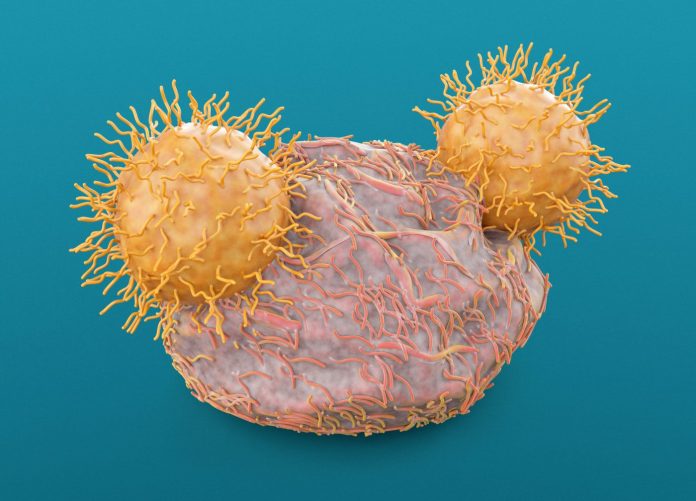
A team of researchers from the Universities of Geneva (UNIGE), Lausanne (UNIL), the Geneva University Hospitals (HUG) and the Vaud University Hospital (CHUV) in Switzerland have discovered how to prolong the functionality of CAR-T cells by inhibiting a specific metabolic mechanism.
CAR-T cell immunotherapy, which involves taking immune cells from a cancer patient and genetically modifying them to recognize and fight cancer cells, has become an increasingly popular research topic in recent years. However, despite the therapy proving very effective against certain blood cancers, it only works for half of the patients. According to researchers, one reason for this could be a premature dysfunction of the modified T-cells.
Reporting in Nature, scientists have now been able to overcome this issue by inhibiting a metabolic process shared by cancer and CAR-T cells known as ‘‘reductive carboxylation.”‘ ‘‘Immune cells and cancer cells have a fairly similar metabolism, which enables them to proliferate very rapidly. We have indeed discovered here that T cells also used this mechanism,’’ explained Alison Jaccard, aPhD student at the UNIL-CHUV Department of Oncology and the study’s first author.
Reductive carboxylation occurs in the absence of oxygen—causing cells to metabolize the amino acid glutamine as an alternative source of energy. To investigate the effects of the mechanism on the modified CAR-T cells, the researchers inhibited the pathway in mouse models of leukemia and multiple myeloma—two types of blood cancer. According to the researchers, the CAR-T cells multiplied normally and did not lose their capacity to attack, indicating that reductive carboxylation is not an essential process for the T cells.
‘‘CAR-T cells must be massively multiplied before they can be administered,’’ explained Mathias Wenes, PhD, research fellow at the Department of Medicine at the UNIGE Faculty of Medicine and senior author of the study. ‘‘But the disease history of the patient, in combination with the amplification process, exhausts the cells: they reach a state of terminal differentiation that precipitates the end of their life cycle without leaving them time to act on the length.’’
In addition to improving CAR-T cell functionality using a reductive carboxylation inhibitor, the researchers also discovered that mice treated with the inhibitor were virtually cured of their cancer. ‘Without reductive carboxylation, the cells no longer differentiate as much and maintain their anti-tumor function for longer. And even, and this is the heart of our discovery, they tend to transform into memory T lymphocytes, a type of immune cell that retains the memory of the tumour elements that needs to be attacked,’’ Wenes added.
The inhibitor used by the researchers to block reductive carboxylation is a drug already approved for the treatment of certain cancers. ‘‘We therefore propose to reposition it in order to extend its use and produce more powerful CART cells in vitro. Of course, their efficacy and safety need to be tested in clinical trials, but we have very good hopes!’’, the authors concluded in a press statement.













